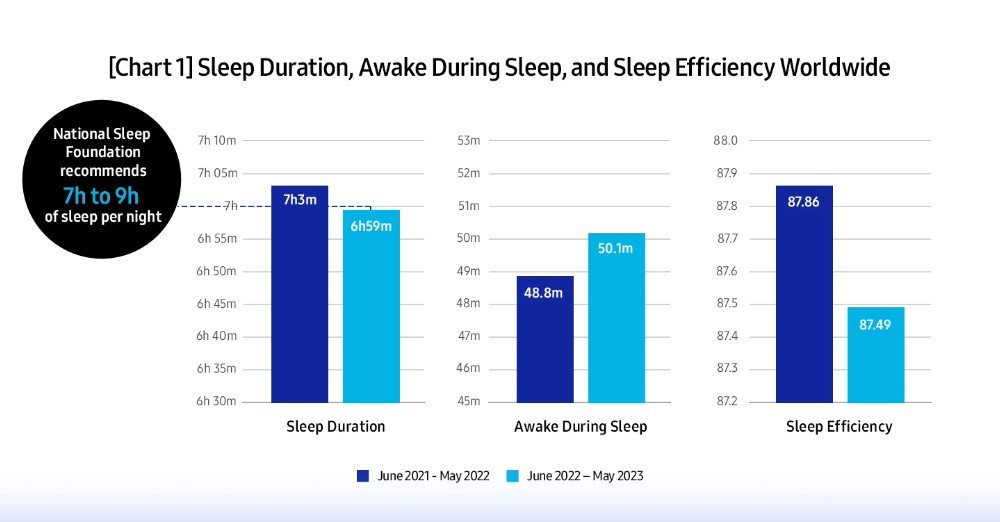In an age where people are increasingly recognizing the importance of sleep for overall health, Samsung is taking a closer look at our global sleep habits and revealing some eye-opening findings. With the ever-growing interest in sleep health, Samsung Health has witnessed a significant 182% increase in users actively tracking their sleep at least once a week over the past two years. However, the burning question remains: Have we been sleeping well?
To address this pressing concern, Samsung embarked on one of the largest single sleep health studies ever conducted. This monumental study involved the analysis of 716 million nights of sleep behaviors from Samsung Health users across the world, shedding light on a global sleep dilemma.
The World Sleeps Less — and Less Efficiently:
One of the most alarming revelations from the study is that average sleep duration has fallen globally from 7 hours and 3 minutes to 6 hours and 59 minutes. This drop is below the recommended 7-hour threshold set by the National Sleep Foundation.
Equally concerning is the increase in awake time during sleep, leading to a decline in sleep efficiency. This trend is consistent across all demographics, with the most significant decrease in sleep efficiency observed in females, older individuals, and in North America.
Sleep Debt Highly Impacting Younger People:
The study also highlighted the impact of inconsistent sleep patterns on sleep quality, with “sleep debt” representing the gap between weekday and weekend sleep. Younger people, particularly those in their 20s, experience the highest sleep debt, nearly double that of those in their 70s.
Counting Penguins, Not Counting Sheep:
In an effort to gain deeper insights into global sleep patterns, Samsung categorized sleepers into “Sleep Animals,” representing distinct sleep patterns with unique characteristics. The majority of participants worldwide identified most closely with the “Nervous Penguins” category, signifying healthy circadian rhythms but frequent sleep interruptions.
Older age groups showed a higher representation of “Cautious Deer,” while younger individuals had more “Sun Averse Moles” and “Sensitive Hedgehogs,” indicating problems with sleep consistency as age decreased.
How Small Habits Can Deliver Quality Sleep:
In addition to identifying sleep patterns, Samsung offers Sleep Coaching programs that aim to improve sleep quality through small daily habit changes. These programs provide personalized coaching based on users’ unique sleep animal type, emphasizing habits like regular wake-up times, physical activity during the day, and getting out of bed promptly.
The effectiveness of Sleep Coaching is evident in the fact that many users improved their sleep habits over time, leading to positive shifts in their Sleep Animal categorization. Users who participated for two months saw more significant improvements in sleep quality, with 94% of “Exhausted Sharks” (the most sleep-deprived category) experiencing a positive change after just two months of coaching.
Better Sleep Health with Samsung:
Samsung’s study highlights the global sleep challenges we face, but it also demonstrates the potential for improvement through small habit changes. With the Galaxy Watch6 series and Samsung Health, users can gain a better understanding of their sleep patterns and receive personalized coaching to achieve healthier sleep habits.
Samsung remains committed to helping individuals across the world improve their sleep quality and overall well-being. Samsung is a global leader in technology and innovation, dedicated to enhancing people’s lives and making the world a better place through its extensive range of products and services.
As Sri Lanka’s No. 1 smartphone brand, Samsung has been awarded the prestigious title of ‘People’s Youth Choice Brand of the Year’ for four consecutive years by SLIM Sri Lanka’s review of the country’s most valuable brands. Samsung’s customer base in Sri Lanka spans across all age groups, with a particular focus on the Gen Z and Millennial segments.

